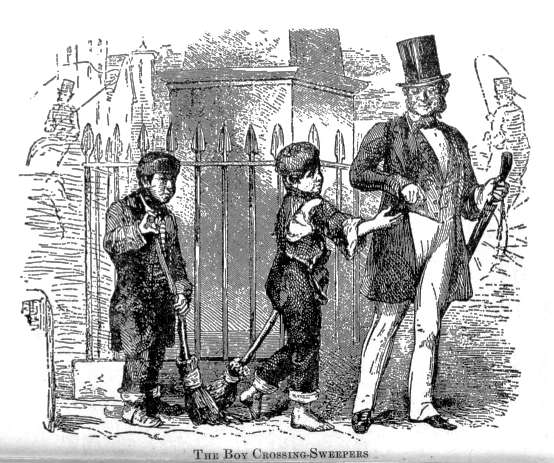A clever and earnest-minded writer gets a commission from the Morning Chronicle newspaper, and reports upon the state of our poor in London; he goes amongst labouring people and poor of all kinds — and brings back what? A picture of human life so wonderful, so awful, so piteous and pathetic, so exciting and terrible, that readers of romances own they never read anything like to it; and that the griefs, struggles, strange adventures here depicted exceed anything that any of us could imagine. Yes; and these wonders and terrors have been lying by your door and mine ever since we had a door of our own. We had but to go a hundred yards off and see for ourselves, but we never did. — Thackeray, writing in Punch, 9 March 1850, p.93.

Introductory Materials
Literature
- Mayhew's London Labour and the London Poor
- Victorian Costermongers: "A Penny Profit out of the Poor Man's Dinner"
- A Review of Robert Douglas-Fairhurst's Selected Edition of Henry Mayhew's London Labour and the London Poor
- (Mayhew's role in) "Punch, or the London Charivari (1841-1992) — A British Institution"
Excerpts from Mayhew's Work

General Cultural and Economic Contexts
- Mayhew on London’s Jews, their occupations, and attitude toward enfranchisement
- Victorian social history
- Victorian political history
Other Related Material
Bibliography
Humpherys, Anne. Travels into the Poor Man's Country: The Work of Henry Mayhew. Athens: University of Georgia Press, 1977.
_____. Henry Mayhew. Boston: Twayne, 1984.
Louttit, Chris. "The Novelistic Afterlife of Henry Mayhew." Philological Quarterly. 85/3-4 (Summer-Fall 2006): 315-42.
Mayhew, Henry. London Labour and the London Poor. Ed. Robert Douglas-Fairhurst. Oxford: Oxford University Press, 2010.
Taithe, Bertrand. The Essential Mayhew: Representing and Communicating the Poor. London: Rivers Oram Press, 1996.
Thackeray, W. M. "Waiting at the Station" Punch. 9 March 1850: 92-93 (reprinted later in Thackeray's Miscellanies, 1856). Internet Archive. Collection Americana. Web. 23 December 2016.
White, Jerry. London in the Nineteenth Century: "A Human Awful Wonder of God." London: Cape, 2007.
Last modified 9 July 2020